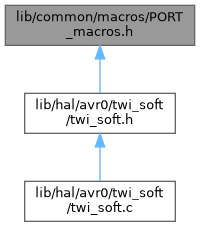Macro definitions for port operations. More...

Go to the source code of this file.
Macros | |
| #define | SET_PIN(NUMBER, ARGUMENT) |
| Concatenates pin identifier components into a full pin name. | |
| #define | SET_PORT(NAME, ARGUMENT) |
| Concatenates port identifier components into a full port name. | |
Detailed Description
Macro definitions for port operations.
This header file contains essential macros for handling port and pin names.
- Note
- These macros serve to improve code clarity and maintain protocol compliance by providing meaningful names for standard port operation indicators.
- Date
- 2025-09-14
- Version
- 1.0 Release
- Copyright
- Copyright (c) 2025 g.raf Released under the GPLv3 License. (see LICENSE in repository)
- Note
- This file is part of a larger project and subject to the license specified in the repository. For updates and the complete revision history, see the GitHub repository.
- See also
- https://github.com/0x007e/avr-common "AVR ATmega GitHub Repository"
Macro Definition Documentation
◆ SET_PIN
| #define SET_PIN | ( | NUMBER, | |
| ARGUMENT ) |
Concatenates pin identifier components into a full pin name.
This macro concatenates the token PIN, the given pin NUMBER, and the specified ARGUMENT to form a complete pin identifier.
For example, SET_PIN(3, _CTRL) expands to PIN3_CTRL.
This is useful for handling pin-related registers or bitfields in a flexible and generic way within embedded code.
- Note
- The macro uses the token-pasting operator (##), so arguments must be valid tokens suitable for concatenation.
◆ SET_PORT
| #define SET_PORT | ( | NAME, | |
| ARGUMENT ) |
Concatenates port identifier components into a full port name.
This macro concatenates the token PORT, the given port NAME, and the specified ARGUMENT to form a complete port identifier.
For example, SET_PORT(A, .DIR) expands to PORTA.DIR.
This is useful for handling port-related registers or bitfields in a flexible and generic way within embedded code.
- Note
- The macro uses the token-pasting operator (##), so arguments must be valid tokens suitable for concatenation.